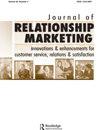Brand Power Relationships: A Co-Evolutionary Conceptual Framework
Q2 Business, Management and Accounting
引用次数: 10
Abstract
Abstract In the era of the Internet and networking, stakeholders increasingly acquire power by influencing brand value and meanings. However, this does not imply that marketing managers have lost their power over brand creation and management. Thus, the aim of this study is to explore brand power relationships taking the co-evolutionary perspective as conceptual lenses. In particular, this article seeks to address the competitive relationship between the corporation and its stakeholders in determining the corporate brand evolution over time, suggesting that corporate brand management is successful when co-evolving power relationships are established. The relational interplay between managers and stakeholders is framed into the Brand Power Relationship Model that suggests four potential evolutionary paths. It offers new brand typologies supported by examples from business practices, which mirror four different ways of managing and adapting brands over time; namely, through the None’s Brand, the Managers’ Brand, the Stakeholders’ Brand, and the Co-Evolutionary Brand. Focusing on the latter, this study depicts managers and stakeholders as having reciprocal influences and co-determining themselves, thus triggering interrelated relational effects that influence corporate brand evolution over time. The bilateral power of managers and stakeholders is framed into a further model, focused on corporate brand co-evolution. It is proposed that corporate brands can successfully co-create their value and meanings over time only if corporations co-evolve with their environment—in this study, multiple external stakeholders.品牌力关系:一个协同进化的概念框架
在互联网和网络化时代,利益相关者越来越多地通过影响品牌价值和意义来获得权力。然而,这并不意味着营销经理已经失去了品牌创造和管理的权力。因此,本研究旨在以共同进化的视角来探讨品牌权力关系。特别是,本文试图解决企业与其利益相关者之间的竞争关系,以决定企业品牌随着时间的推移而演变,这表明当共同演变的权力关系建立时,企业品牌管理是成功的。管理者和利益相关者之间的关系相互作用被纳入品牌权力关系模型,该模型提出了四种潜在的进化路径。它提供了新的品牌类型学,并以商业实践为例,反映了四种不同的管理和适应品牌的方式;即通过“无品牌”、“管理者品牌”、“利益相关者品牌”和“共同进化品牌”。以后者为重点,本研究将管理者和利益相关者描述为具有相互影响和共同决定的自我,从而引发影响企业品牌演变的相互关联的关系效应。管理者和利益相关者的双边权力被构建成一个进一步的模型,重点是企业品牌的共同演变。本文提出,随着时间的推移,只有当企业与环境共同进化时,企业品牌才能成功地共同创造其价值和意义。
本文章由计算机程序翻译,如有差异,请以英文原文为准。
求助全文
约1分钟内获得全文
求助全文
来源期刊

Journal of Relationship Marketing
Business, Management and Accounting-Marketing
CiteScore
10.20
自引率
0.00%
发文量
7
期刊介绍:
The Journal of Relationship Marketing is a quarterly journal that publishes peer-reviewed (double-blind) conceptual and empirical papers of original works that make serious contributions to the understanding and advancement of relationship and marketing theory, research, and practice. This academic journal is interdisciplinary and international in nature. Topics of interest (not limited to): Evolution and life cycle of RM; theoretical and methodological issues in RM; types of RM, networks and strategic alliances; internal communication, quality, trust, commitment, satisfaction, loyalty, and dissolution in RM; applications of RM in different disciplines and industries; international perspectives in RM; RM strategies in services economy, higher education, and e-commerce; RM, technology, and the Web; profitability and RM; case studies and best practices in RM. If you are interested in becoming an ad-hoc reviewer, please e-mail a brief statement indicating your area of expertise and interest along with a copy of your CV.
 求助内容:
求助内容: 应助结果提醒方式:
应助结果提醒方式:


